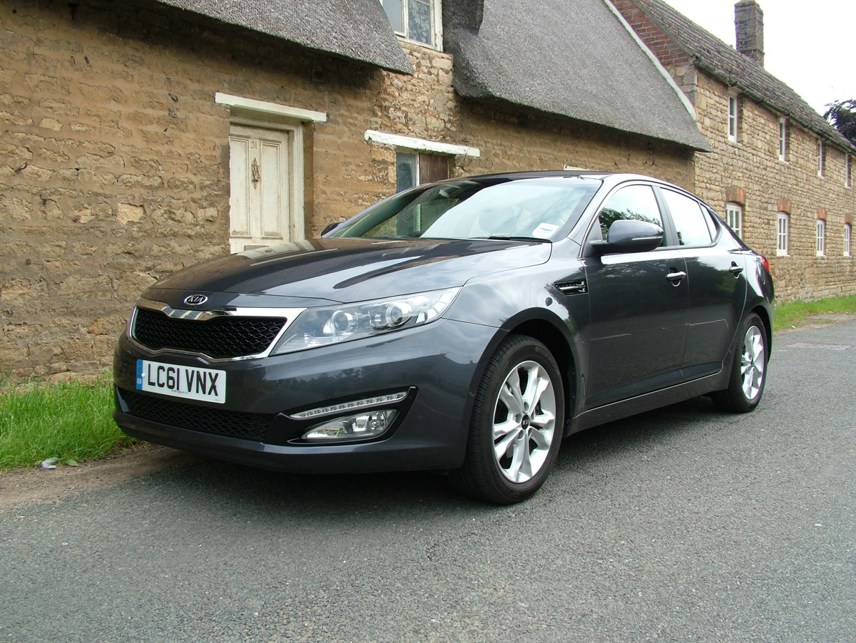Review
Let’s make one thing clear from the outset: I like Kia. It’s an up-and-coming brand that’s not afraid to do things a little differently with well-designed cars and a bullish approach to the market (note its outstanding seven-year warranty).
I also like the Optima. It’s a spacious, great looking family car, and comes well equipped in Tech 2 trim with Bluetooth, MP3 inputs, touch-screen sat-nav, voice recognition, reversing camera, cornering lights and part-leather seats. All yours for £21,640.
And with running costs of just 36.08ppm (compared to 36.54ppm for a comparable Ford Mondeo, the sector’s benchmark car) and BIK at £822 a year (Mondeo: £826), it’s a good choice for fleets and company car drivers.
However, 10 months and 17,000 miles after we took on our long-term Optima, there are a few niggles emerging. It didn’t make the best first impression when taking the keys from another tester: the key wobbles about in the fob and screams ‘cheap’ rather than quality.
A similar quality control concern arose with the handbrake, which also has excessive sideways travel after less than a year’s use. Elsewhere though, everything is in good working order with little signs of wear.
The sat-nav is intuitive to use and while we’ve been critical about four-digit postcode inputs on some premium brands, in truth it’s not exactly an inconvenience to put in a street name.
But I’ve yet to find a way to permanently switch off the voice instructions, and it’s been some time since I’ve been in a car where the sat-nav doesn’t recognise the dual-carriageway A421 from Bedford to Milton Keynes, completed in 2010. An updated CD is required.
Fuel efficiency is good: we’re averaging a little under 54mpg, close to the official 57.6mpg combined figure, without too much effort. And that was during the recent cold snap during which the stop-start system seems a little reluctant to work.
That’s possibly because it runs off the main battery, so in minus temperatures, with the heating blaring, there is little spare power to operate everything without the engine running.
However, when it does work it is very good – up to 90 seconds of switch-off time that recurs during repeated stopping (see a previous review on fleetnews.co.uk for how much fuel you could save).
Compare that to our Vauxhall Insignia long-termer’s system which is happy to kick in the first time, but not for repeated use.
The best stop-start systems are in the likes of the Mercedes-Benz E-class we recently tested, which run off a secondary battery and, therefore, engage every time the car stops.
A few niggles then, but on balance the Optima is an excellence choice for fleets. Just one note of caution though. Last year, Kia sold 1,148 Optimas of which 81% (931) were to fleets. However, this year it has only secured 500 models for the UK due to demand from around the world.
That could mean delays for prospective customers and disappointments for some company car drivers.
However, a Kia spokesman had this to say. “Will this impact lead times? Well, yes and no. It may have a slight increase but we have a very good level of stock in the UK to fulfil customer orders and, having had the car on sale for a year, a better understanding of which variants are the most popular so we can focus on ensuring we have those.”
Specs
| Manufacturer | Kia |
| Model | Optima |
| Specification | |
| Model Year | 0.00 |
| Annual VED (Road tax) | £0 |
| BIK List Price | £21,640 |
| CO2 | 128g/km |
| BIK Percentage | 19% |
| Insurance Group | N/A |
| CC | N/A |
| Fuel Type | Diesel |
| Vehicle Type | |
| Luggage capacity (Seats up) | N/A |
Running Costs
| P11D | £21,640 |
| Cost per mile | 38.83ppm |
| Residual value | £7,300 |
| Insurance group | N/A |
| Fuel Type | Diesel |
| Cost per mile | 0.00ppm |
| Fuel | 0.00ppm |
| Depreciation | 0.00ppm |
| Service maintenance and repair | 0.00ppm |
Info at a glance
-
P11D Price
£21,640
-
MPG
57.6 -
CO2 Emissions
128g/km -
BIK %
19% -
Running cost
3 Year 60k : £7,300 4 Year 80k : £5,425 -
Fuel Type
Diesel



















